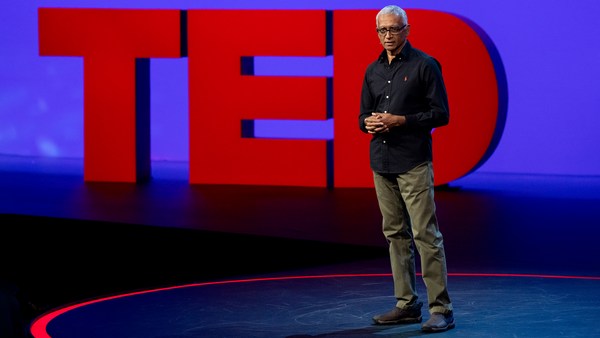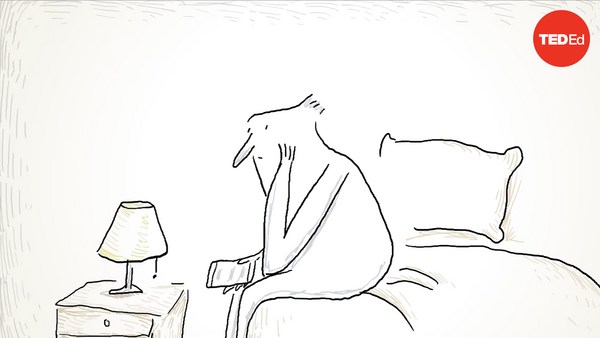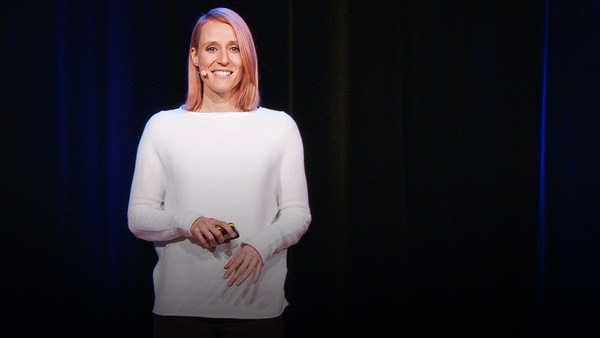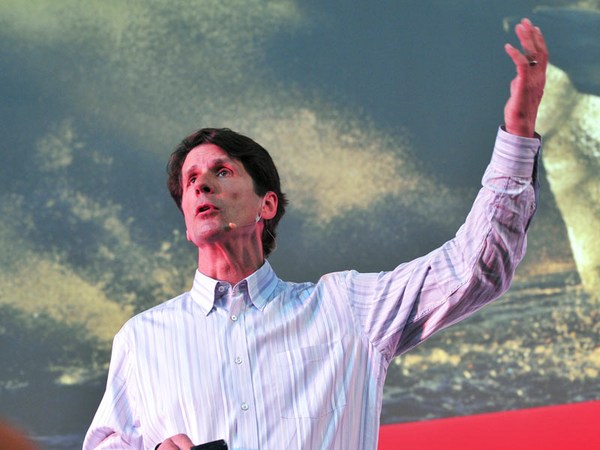About 1,600 years ago, St. Augustine wrote "The Confessions," which was the story of his youthful descent into sin and his later conversion to Christianity. And book two of “The Confessions” has a great beginning: "I propose now to set down my past wickedness and a carnal corruption of my soul." So you expect sex.
(Laughter)
But to the disappointment of readers over the centuries, the sin that Augustine talks about... isn’t carnal at all. It has to do with pears. He and his friends break into an orchard and they steal some pears. And that was it. They didn’t have anything against the person who owned the orchard. They weren’t hungry; they threw the pears to pigs.
What stunned Augustine and disturbed him was that he seemed to be motivated by a desire just to do wrong. He writes, "If any part of one of those pears passed my lips, it was the sin that gave it flavor. I had no motivation for wickedness except wickedness itself. I was foul and I loved it."
(Laughter)
Now I'm a psychologist and I was interested in real-life stories of perverse actions, so I started The Perversity Project where I invited people to send me stories about perverse things that they did. I defined these acts as "when you choose to do something you know is wrong, morally or otherwise, at least, in part, because it's wrong."
So one of the first stories I got was, "Flirted with a woman's boyfriend knowing fully well he liked me. I knew I could steal him if I wanted, but I didn't want to do that. I just wanted her to feel uncomfortable whenever the three of us were in the same room."
(Laughter)
"Causing people pain is wrong, but that's exactly why I did it." And in fact, this is the plot of the Dolly Parton song "Jolene."
(Laughter)
Sometimes it's self destructive. A young man wrote to me, "Ice skating on a pond, dark unfrozen spot 30 yards out, instead of avoiding it, I skate towards it, knowing but wondering, knowing but wondering... and splash!"
(Laughter)
Now psychologists have long been interested in these sort of violent, disruptive, perverse acts and the kinds of people who do them. An example people often give is the Joker from the “Batman” comics. In Christopher Nolan's film "The Dark Knight," Alfred, Batman’s butler, describes the Joker by saying, "Some men can't be bought, bullied, reasoned or negotiated with. Some men just want to watch the world burn." And psychologists have thought up a "need for chaos" scale that gives you a bunch of statements and how much you agree with them will tell you how much you want to watch the world burn.
So do this quietly in your head. "I need chaos around me. It's too boring if nothing is going on." "Sometimes I just like destroying beautiful things."
But not all the stories I got had that kind of nature. Some were a little bit more benign. Here's one of my favorites. "On one occasion in my early 20s, I was out with a friend. He decided to get himself an ice cream and before he had a chance to try it, I stuck my finger in it."
(Laughter)
"I tried to play it off as a joke, but really I had the sudden thought, ’Man, it would be -- messed up if I just jammed my finger in his ice cream.'"
Someone else wrote me, "When I was in a professional choir, at every concert, I felt the desire to sing a few notes very incorrectly on purpose. To this day, I don't completely understand why." Someone else wrote me, and this is kind of the sweetest, saddest little example of modest perversity: “Sometimes I walk on the grass instead of the path just because I know it's wrong."
(Laughter)
Now a lot of perversity makes the world worse. I wouldn't want an Uber driver who scores high on a "need for chaos" scale. And I don't want a friend or a colleague either.
But sometimes, I'll suggest to you, perversity can be clever, creative, beautiful. And there are some examples from art.
There was an illustrious art exhibition in New York City in 1917, and they said, "You could send in anything you want, we'll accept everything." So Marcel Duchamp sent in a urinal, described [as] a fountain, and they rejected it. They said, "No, no, we just accept artwork." But Duchamp insisted it was artwork and the resulting controversy turned out to be one of the pivotal moments in the history of modern art.
Or take Banksy. A few years ago, Banksy sold a painting “Girl with Balloon” at Sotheby’s, at auction, and he set up the frame so that the moment the painting was sold, the moment the gavel went "boom," a machine in the frame shredded the painting halfway through, horrifying the audience. But... getting on the front pages of newspapers all over the world. Later on, describing it, Banksy quotes a Russian anarchist who says, "The urge to destroy is also a creative urge."
Or take comedy. Perversity is part and parcel of comedy. So much of what's funny is when people do things that are irrational or immoral. In the right hands, perversity is such a source of joy.
Perversity can also be powerful. Rory Sutherland wrote, "Irrational people are much more powerful than rational people." He gave two reasons why this is so. The first is, their threats are so much more convincing.
Suppose I'm in a confrontation with you and you threaten me and you’re a rational, reasonable... person. So I know your threats ...
Woman: Ehh.
(Laughter)
PB: Well, I know your threats are going to be normal, proportional and reasonable. But, if as somebody is hinting here, you’re a perverse agent, I have no idea what you're capable of and you're far more frightening to me.
Second reason is, if you're wholly predictable, people learn to hack you. So again, if you're rational and I have to outsmart you, figure out what you're going to do next, I figure you’ll do the rational thing. If you're perverse, you're harder to predict. And so harder to hack.
Edgar Allan Poe, describing perversity, described, talked about imps, little magical demons in our heads that cause us to do terrible things. But like I said, I'm a psychologist, I don't believe in imps. I think what we do has reasons, has motivations. And I think for perverse actions there is a range of them.
One of them was mentioned by Augustine. So later on, after describing the incident with the pears, he writes, "I would not have done it by myself. My satisfaction did not lie in the pears, it lay in the crime itself, committed in league with a gang of sinners." The social force drove him.
And there are other things, too. One force that really interests me goes under many names: self-governance, freedom, liberty, agency. Call it autonomy. Call it a desire to be free to do what you want, free of the constraints of other people and free also of the constraints of rationality and morality.
And Jonah Berger gives a nice example of this. He talks about the Tide Pod challenge of a few years ago, where many teenagers, instead of using these as detergent products, bit into them and sometimes consumed them. Now, as you might imagine, Procter and Gamble, who own the products, were incredibly unhappy about this and they set up an extremely expensive ad campaign designed to stop people from consuming these products. And one of their campaigns involved a ... popular football player known as Gronk.
So the ad would begin, "Hey, Gronk, is eating the pods ever a good idea?" And Gronk responds, "No, no, no." Berger points out, when this ad came up, consumption of the pots shot up.
(Laughter)
Not down. "Nobody's going to tell me what to do. Who is this Gronk telling me what to do? I want to be an autonomous, free being."
And psychologists call this reactance. This means it's "an unpleasant feeling that emerges when people experience a threat to or loss of their free behaviors." And there's a wealth of laboratory studies looking at reactance. So they test the idea that what you try to do is reestablish the threatened freedom.
And so one of the studies, for instance, looks at binge-drinking ads and finds that when binge drinking ads are particularly heavy-handed, people often respond by drinking more. ... "I'm going to reestablish my freedom." "I'm going to do what I want."
Or take threats of reprisal. There's a lovely study by a team of political scientists which asked you, asked the subjects, to imagine that they’re an ambassador to a country and they're deciding whether or not to have sanctions towards that country. In one condition, the dictator says "If you do sanctions towards our country, that's OK, I won't do anything." In the second condition, the dictator says, "If you do sanctions towards our country, I will unleash terrorist attacks against you."
What's the stunning finding from this is that in the second condition, not the first, they were more likely to do it. A lot of our perverse actions are in response to people telling us not to do what we want to do, and it makes us want all the more to do that thing.
I think there are two lessons from the study of perversity. One is to appreciate its role in everyday life. It's really worth knowing that there are people out there who really do want to watch the world burn. And I think it's also worth knowing that each and every one of us, at some point in our life, wants to watch the world burn at least a little bit.
(Laughter)
I think it's worth knowing, at least for consequential decisions like choosing who to vote for, that people aren't just motivated by material self-interest or by an affiliation to social and political group. Sometimes people want to be autonomous beings, they want to be free. And telling these people, "What you're doing is stupid," "what you're doing is irrational," "what you're doing is immoral," can have the paradoxical effect of motivating them to do exactly what you don't want them to do.
The second lesson of perversity has to do with our everyday lives. A lot of perversity is awful. I think the world would be better off without it. But I think we've seen a little bit that perversity could be funny. It could be clever. I think it can make the world a better place. And so I guess I'd suggest that a life with a little bit of perversity in it, a life where sometimes you put your finger into your friend's ice cream, is a life that's a lot more interesting.
Thank you.
(Applause)





